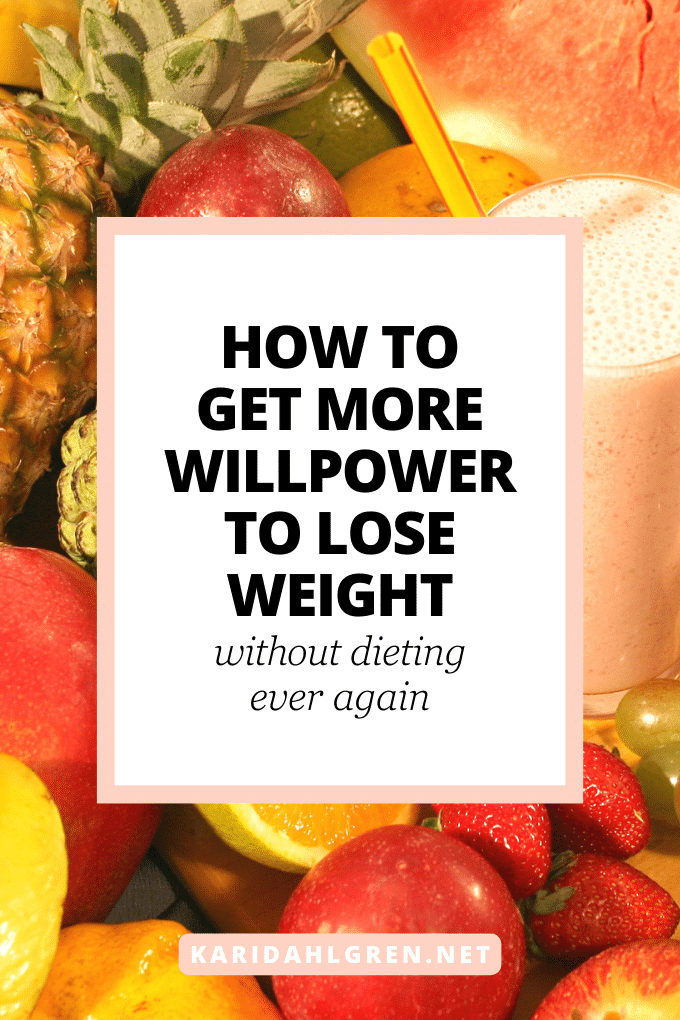
You’ve probably heard it before: willpower is a finite resource, and it also gets stronger with practice, much like a muscle. What most diet campaigns fail to share, however, is that using your willpower towards restrictive dieting does not help with weigh loss—at all. Clinical evidence demonstrates this.
I dug through twenty one clinical studies to create a compelling case for redirecting your willpower away from dieting and, instead, focusing it on eating psychology. Restrictive diets don’t work, and they are a waste of willpower. When you redirect your willpower towards your psychology, that’s where you’ll find momentum.
First, let’s dig into the science of willpower, where it comes from, and how to get more of it. If you’re interested in mastering your mindset, you’re in the right place as my blog was recently named one of the top 5 eating psychology blogs, likely due to how much research I pour into these posts.
Why Dieting Is a Waste of Your Willpower to Lose Weight
At first glance, weight loss seems to follow a straightforward equation: use your willpower to consume fewer calories than the body expends. Make sure there are more calories out than calories in. However, when put into practice through restrictive dieting, this approach proves to be counterproductive and ineffective.
The body’s primary directive is survival, which means calorie restriction is interpreted as a sign of scarcity. In response, the body activates a biological rebellion against what it perceives to be a threat to its survival.
One of the primary actors in this rebellion is ghrelin, often referred to as the “hunger hormone.” When we restrict our food intake, ghrelin levels rise, leading to intense food cravings.[1] This makes it even more tempting to eat “naughty” or “forbidden foods” and break your diet.
This biological reaction is often misinterpreted as a psychological problem – a lack of willpower – but it’s not. It’s simply your body’s reaction to restriction.
Additionally, restriction slows your metabolism, prompting the body to conserve energy—sometimes in the form of fat—the next time it receives food.[2] This not only makes weight loss more difficult but also primes the body for weight gain.
In fact, studies have shown that dieting is linked with long-term weight gain, not weight loss.[3] Some studies even show that people are more likely to regain even more weight than originally lost.[4]
If this isn’t a compelling enough reason to give up dieting right now, let’s look at some of the psychological ramifications as well. Restrictive eating is strongly correlated with depression and preoccupation with food.[5], [6] Constant self-denial can result in feelings of guilt and shame when we “succumb our cravings” and “break our diet” – even though it’s just a biological response to restriction.
What can we do if dieting doesn’t help with weight loss? Is it an empty chase, searching for ways to get more willpower to lose weight? We will get to these question soon, but first it’s important to understand how willpower works because there are many myths around that, too.
The Science of Willpower & Why We Should Redirect It
Clinical evidence shows that willpower is a depletable or finite resource.[7] Once you use it up, it’s gone until replenished, which can take time if you’re tired, stressed, or sleep-deprived. However, new research debunks these findings. Newer studies suggest that willpower’s perceived limitations might be more psychological than physiological.[8], [9]
In other words, instead of willpower being a finite resource, new evidence shows that believing that willpower is depletable might actually lead to its depletion. Still, even with these new findings, it’s important to acknowledge that the collective evidence points to willpower as a limited resource that can be drained through overextension, especially in the realm of dieting.[7], [10], [11], [12]
Fortunately, willpower can be strengthened through consistent practice—just not the practice of dieting. While willpower does increase the more we use it, using willpower to lose weight through dieting only triggers the restrict-binge cycle and leads to weight regain.[3], [4]
Instead of using willpower to lose weight through dieting, we need to redirect it towards eating psychology. For me personally, this is when I finally gained traction in what felt like an endless pursuit of weight loss.
How to Redirect Your Willpower to Lose Weight
The topic of willpower is one of my favorites because I firmly believe that most compulsive eaters already have an abundance of willpower—it just needs to be redirected. Here is my YouTube video where I explain this concept:

The practice of dieting depletes your willpower and places you back at Square One – either regaining the weight or regaining it and then some. I have been there many times before, and it is beyond frustrating and demoralizing—and it’s not just in my head. Studies have shown that yo-yo dieting is correlated with depression.[13]
Instead of pouring your willpower into dieting, I am a huge advocate of redirecting your willpower towards eating psychology. This way, you aren’t battling upstream against your biology.
Here are steps you can take to redirect your willpower towards weight loss via psychology:
1. Practice Letting Go of the Food Rules
Embracing the psychological aspect of weight loss means shifting from strict dieting to letting go of the food rules. This aligns with the tenets of intuitive eating—a practice that encourages listening to hunger cues and granting permission to eat any food within the boundaries of hunger and fullness.
A pivotal study highlights the counterproductive nature of food restrictions, revealing that such limitations significantly heighten our fixation on the very foods we’re avoiding.[14] This preoccupation not only undermines your willpower to lose weight but can also lead to a rebound effect where overconsumption becomes more likely once willpower is depleted.
2. Stop Eating Past Fullness with Psychological Tools, Not Restriction
If you struggle with eating past fullness, it can be scary to let go of the food rules over the fear of overeating. To help with this, use my Stop, Drop, & Feel method to stop a binge in its tracks.
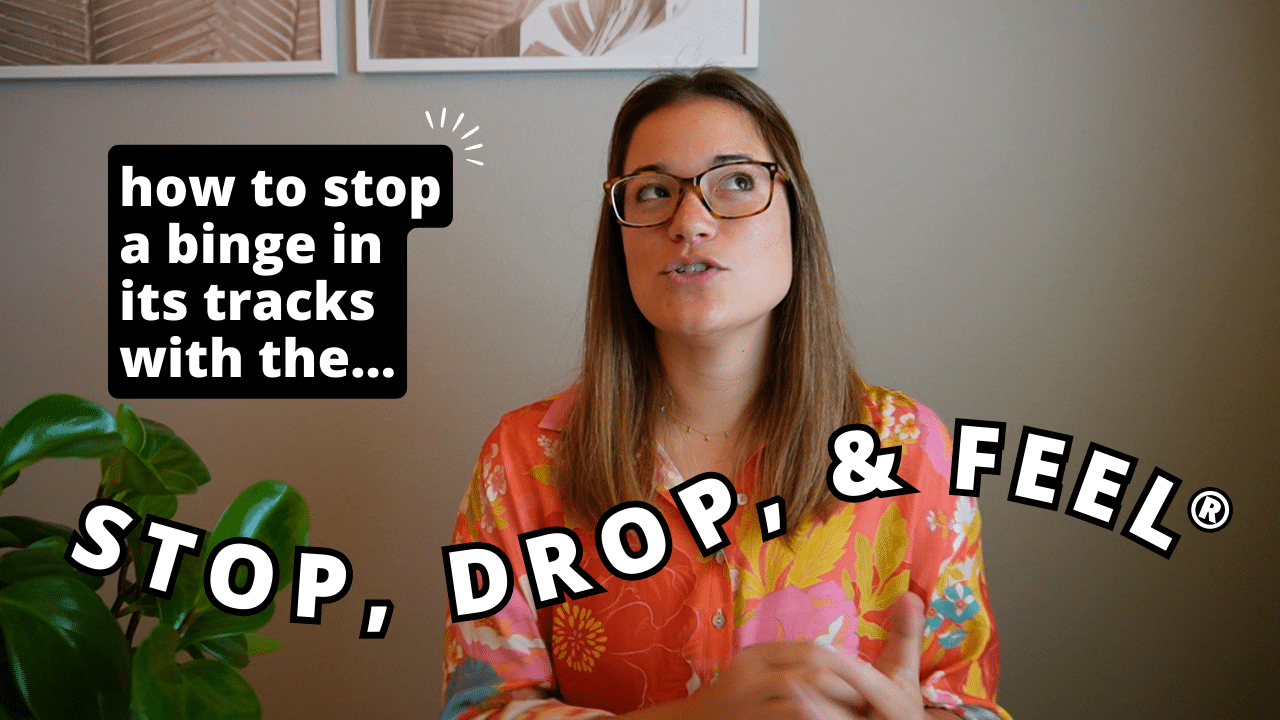
The premise behind this tool is that, behind the desire to eat without hunger, there is an uncomfortable emotion we are either suppressing or ignoring. Until we learn how to cope with these uncomfortable emotions without food – a skill I call emotional tolerance – we can’t address the root cause of overeating.
Here’s how Stop, Drop, & Feel works:
- Stop: Before acting on the urge to eat without hunger, pause and promise yourself that you can still eat after the SDF if that’s still what you really want, but first you’re going to try this.
- Drop: Go to another room (if possible) and drop into your body. Get curious about how you’re feeling.
- Feel: For two minutes, allow yourself to experience your emotions without judgment or analysis.
By training in sitting with this discomfort instead of buffering with food, you develop tolerance for discomfort, or emotional tolerance. This is an evergreen skill that can help you reach your natural weight over the long-term, unlike the skill of dieting which only causes rebounds.
3. Make Gradual, Consistent Change & Set Realistic Goals
Try setting a goal of using the Stop, Drop, & Feel technique for just two minutes a day. This is an excellent way to redirect your willpower to lose weight and focus on psychology over dieting.
Best of all, when a task is only two minutes long, we are much less likely to procrastinate on it. Though two minutes might not seem like much time, it is enough to develop emotional tolerance over the long run. I can personally attest to this, as I never did the SDF for longer than 2 minutes when I was still grappling with binge eating; and now I struggle with compulsive eating dramatically less.
4. Plan Some Meals Ahead of Time
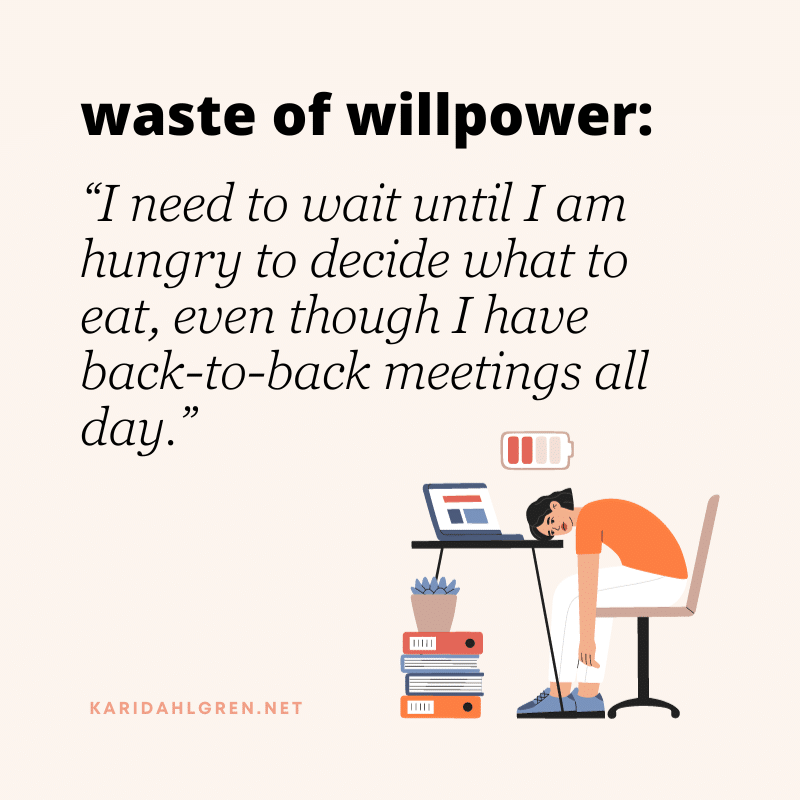
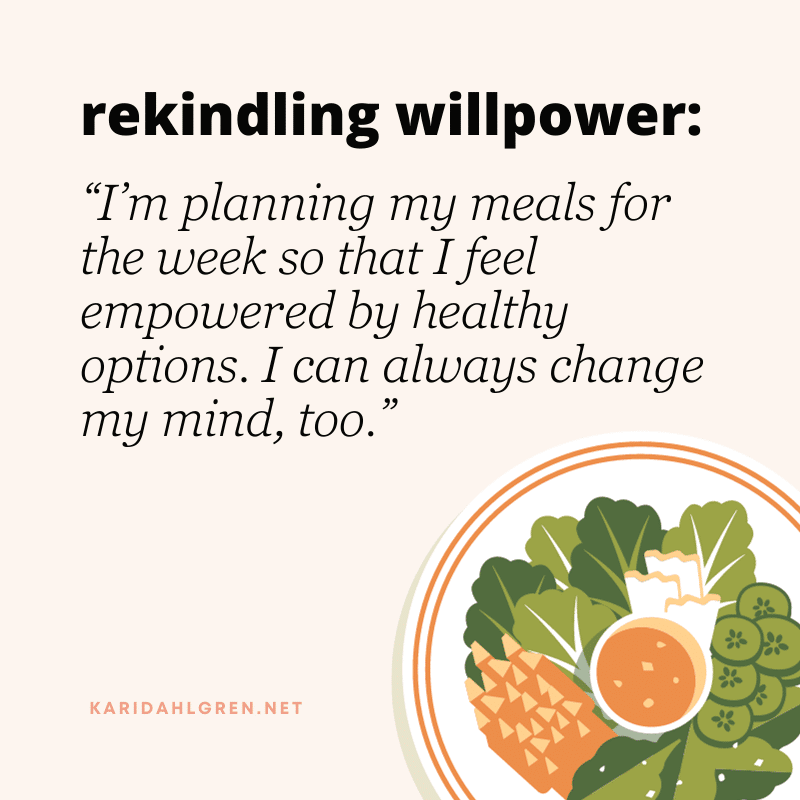
Alongside psychological tools is the tool of food itself. It can be used to improve your willpower to lose weight by planning your meals to make things easier for yourself.
Some people feel that planning is antithetical to intuitive eating; but in reality, it helps it. When hunger strikes in the middle of a hectic day, many of us don’t have the luxury of choice. By planning meals in advance, you empower yourself with easy options that are both satisfying and in line with your body’s needs.
5. Redesign Your Environment to Conserve Willpower
Redesigning your environment to reduce overeating is a strategic move to conserve willpower for essential tasks like the Stop, Drop, & Feel technique. All-too-accessible snacks are a needless drain on your willpower reserves.
Studies have shown that simply placing tempting foods out of immediate sight and reach can reduce consumption.[15] Study participants ate more chocolates when they were visible and within arm’s reach, highlighting the importance of environmental cues.
By removing snacks from direct view, you can redirect the willpower ordinarily spent on resisting visible temptations to more profound practices like building emotional tolerance through the SDF.
6. Stop Using Food as a Reward
If you tend to use food as a reward, shifting the vehicle for the reward can help you leverage your willpower to lose weight. Many people struggle with cravings hyperpalatable foods—those high in fat, carbs, sugar, or salt—and using them as rewards is one way we try to limit them. However, hyperpalatable foods light up the brain’s reward pathways, and reinforcing them as treats may perpetuate a cycle of cravings and overindulgence.[16]
However, the strategy is not to eliminate these foods, as restriction ironically heightens our desire for them. Instead, it’s important to decouple the act of eating from rewarding yourself. By identifying and implementing non-food related rewards, we can reduce the psychological power food holds over us, making willpower more effective.
7. Establish a Balanced Exercise Routine
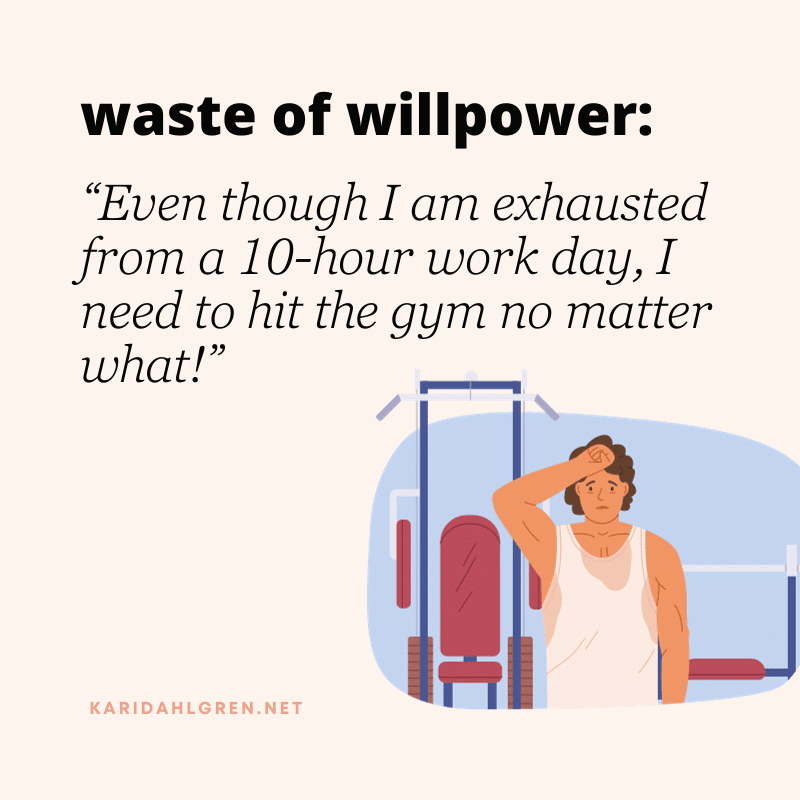
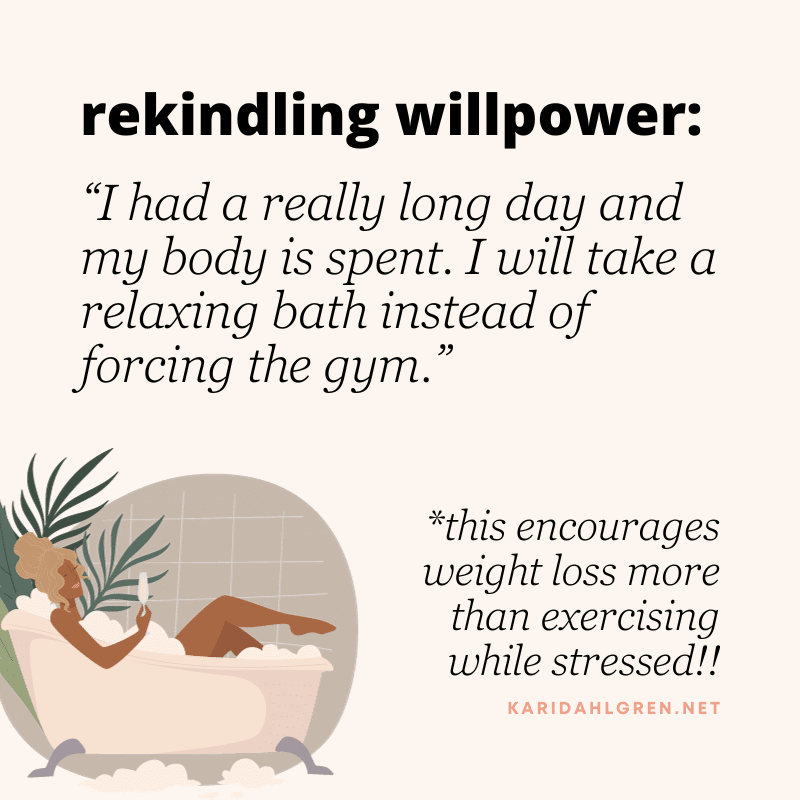
Do you ever force yourself to exercise even when your body is asking for rest? For people with high-stress lives, this can prove counterproductive to weight loss, as stress is a known precursor to weight gain, and excessive exercise can contribute to that stress.[17]
Adopting an exercise regimen based on well-being rather than weight loss can help you find a more sustainable approach to health. Intuitive movement—exercising in sync with the body’s cues and comfort level—encourages a positive attitude towards physical activity.
Instead of wasting your willpower forcing yourself to exercise when your body is asking for rest, intuitive movement encourages you to find gentler forms of movement that honor your body. This leaves willpower left over for other weight loss remedies rooted in eating psychology like—surprise, surprise—the Stop, Drop, & Feel.
How to Protect Your Willpower to Lose Weight
Protecting your willpower is just as crucial as building it because willpower is a finite resource.[7], [10], [11], [12] Even with the a strong reservoir of willpower, it can be depleted with overuse, especially if you accidentally start battling with your body’s biological response to restriction without knowing it.
Here are more tips to safeguard your willpower:
8. Practice Coping with Slip-ups Without Radical Behavior Changes
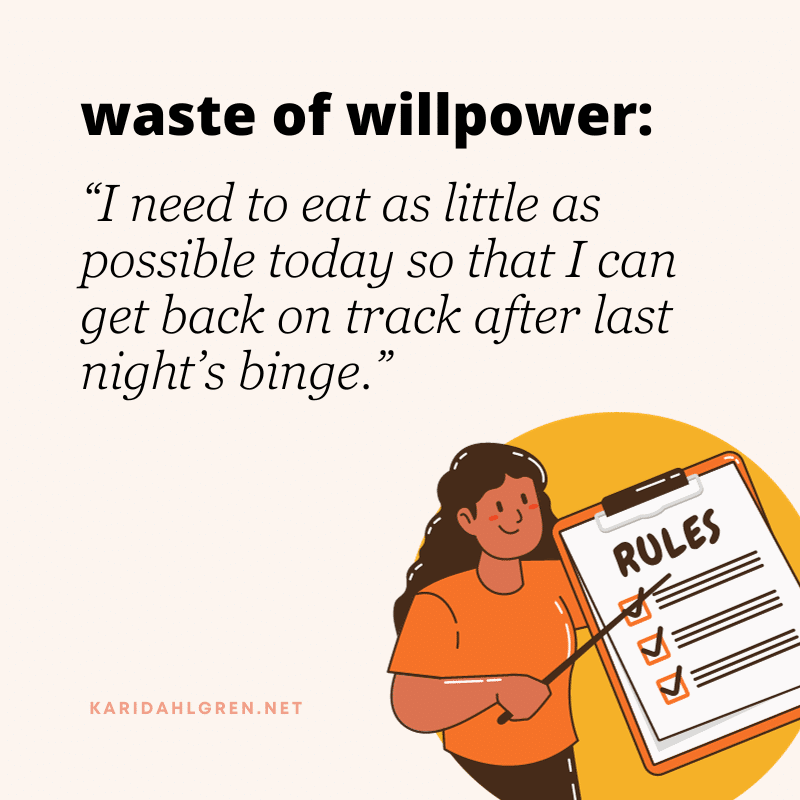
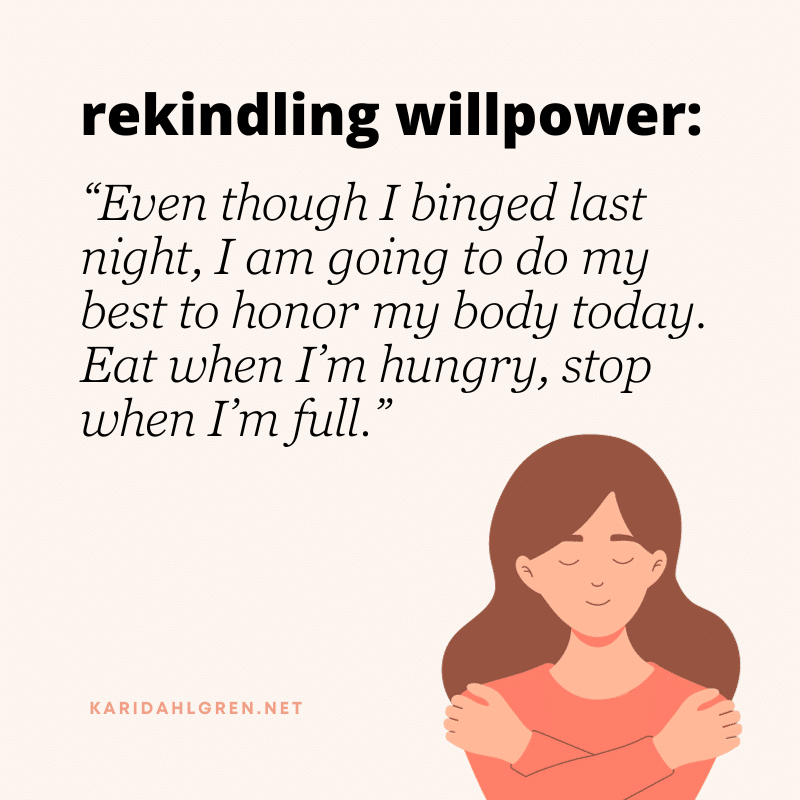
Are you familiar with the concept of yo-yo dieting? Formally known as weight cycling, it describes a pattern of intermittent restrictive dieting followed by periods of “feasting.” For some, yo-yo dieting spans across months- or even years-long cycles. For others, it can happen within a day.
This can spur a common question: “If I overeat one day, should I undereat the next?” The answer is no, especially not if you want to conserve your willpower to lose weight.
Reacting to overindulgence with severe calorie restriction can initiate a counterproductive process known as adaptive thermogenesis.[18] This bodily response lowers your metabolic rate to conserve energy, making subsequent overeating more likely to result in fat storage rather than being used for energy.
The restrict-binge cycle also affects hunger and satiety hormones, increasing ghrelin (hunger hormone) and decreasing leptin (satiety hormone), potentially leading to greater appetite and overeating.[19] This hormonal shift, along with psychological stress of forcing a restrictive diet, may heighten cravings for high-calorie foods, exacerbating the restrict-binge cycle.[20]
Instead of correcting for overeating by trying to undereat, aim for normal eating. This means eating when you’re hungry, stopping when you’re full, and using your tools like the Stop, Drop, & Feel when you want to eat without hunger. This helps you develop a healthier approach to eating and weight loss that respects both physiological and psychological needs without exhausting your willpower.
9. Ensure Adequate Rest, Recovery, and Sleep for Willpower Maintenance
Adequate rest, recovery, and sleep are non-negotiable for maintaining willpower to lose weight. Studies have shown that a lack of sleep skews levels of leptin, the fullness hormone, and potentially leads to overeating and weight gain.[21]
By getting adequate sleep, you empower your willpower by stabilizing leptin concentrations and thereby curbing the biological drive to eat more than you need. (This does not mean that sleep is the answer to everything, as the drive to overeat is often psychological as well.)
Rest days are equally vital for increasing your willpower to lose weight, as rest days support muscle repair and mental resilience, which is vital for consistent willpower. This is also why intuitive movement helps with willpower, because you’re not forcing yourself to exercise when your body is clearly asking for a break, which means you aren’t wasting that precious willpower.
More eating psychology tips: Dive even deeper into the psychological blocks to weight loss in my free ebook, The Spiritual Seeker’s Guide to Stop Binge Eating. Click here to grab your copy (link opens a popup for uninterrupted reading)
10. Recognize and Celebrate Progress, Reassessing Goals Periodically
Maintain willpower by marking small wins and reassessing your goals to stay aligned with SMART criteria—specific, measurable, achievable, relevant, and time-bound. Often, we don’t notice our successes when we’re busy climbing out of distressing emotions, and celebrating your wins can help keep motivation high.
For example, if you start practicing the Stop, Drop, & Feel, you may notice that it decreases the desire to eat without hunger. However, because weight loss via intuitive eating is much slower than weight loss through restrictive dieting, it can be hard to see your progress. Keeping track can help you stay motivated on this journey of redirecting your willpower away from dieting and towards eating psychology.
Redirecting the Willpower You Already Have to Lose Weight
As you can see, there is compelling clinical evidence showing that dieting doesn’t work. Even though willpower is strengthened through practice, the practice of dieting is a dead-end because no one can outsmart their biology. By redirecting your willpower to your psychology and focusing on emotional tolerance instead of restriction, you’ll find the momentum you’ve been vying for.



